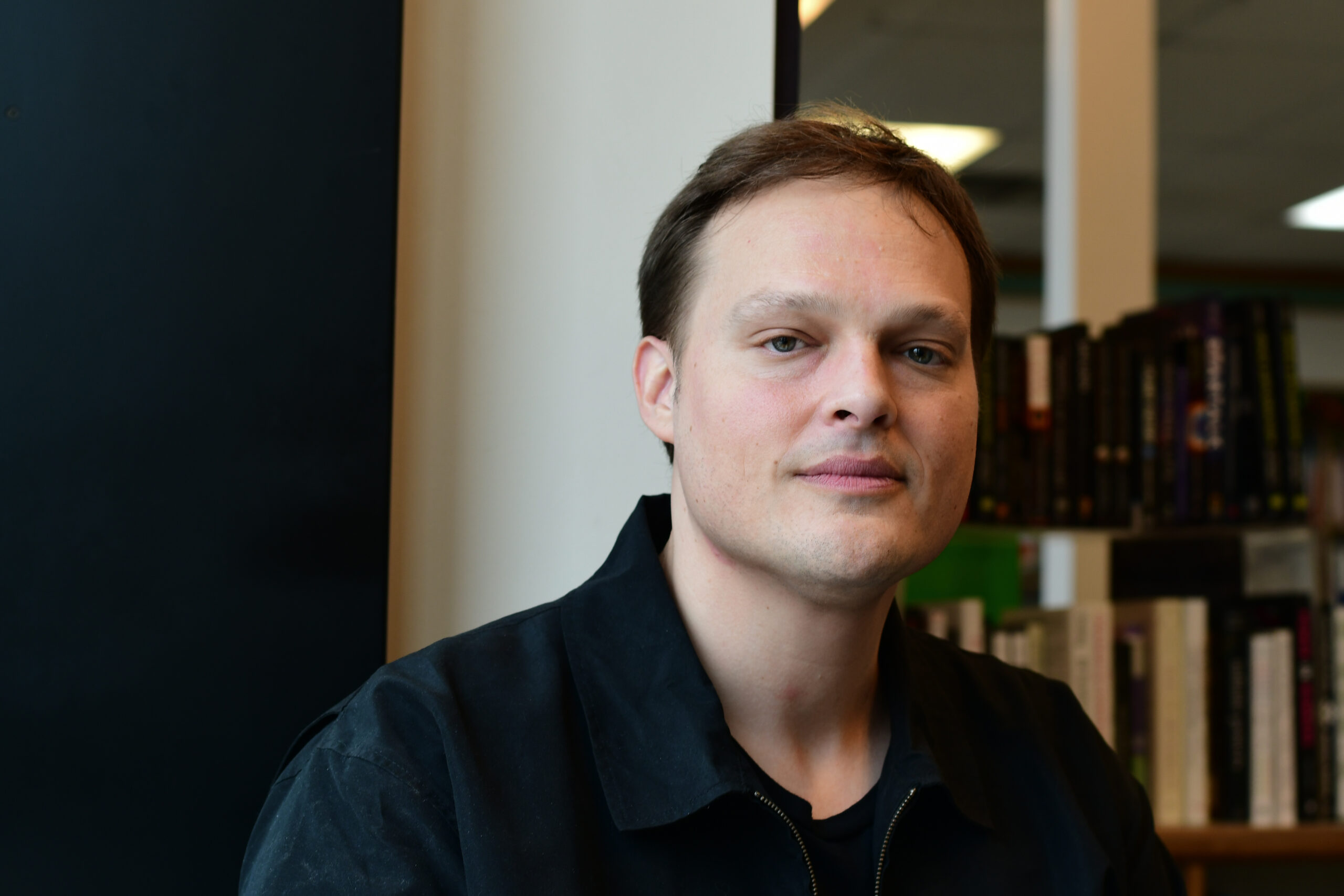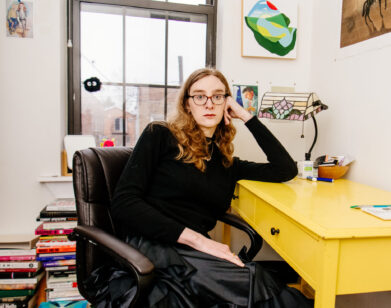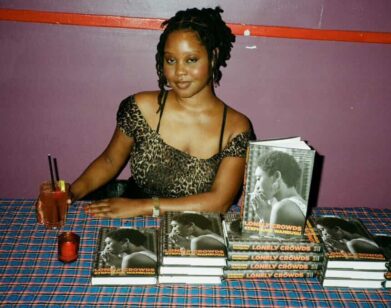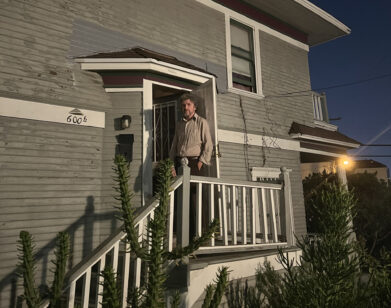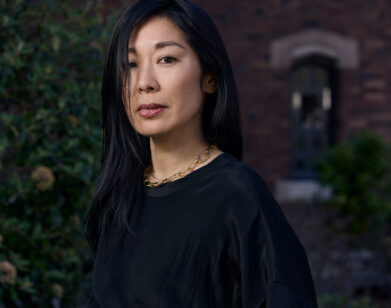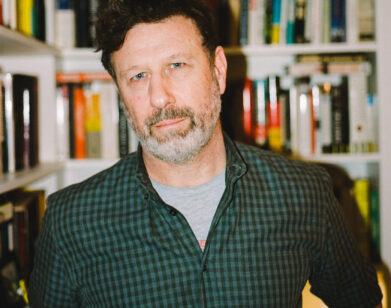LIT
Garth Greenwell on Art, Sex, and the Human Urge For Self-Destruction
When Garth Greenwell told me that “actually writing embodied experience is basically impossible,” I nearly laughed in his face. There are few authors who make me feel as alive and rooted in my body as he does. And, somewhat unfairly to the rest of us who are fighting for our lives to describe a tree (branchy? vegetal?), Greenwell’s writing also adeptly captures how it feels to think. His gloriously winding sentences, in which art becomes a “laboratory for thinking,” are as thought-provoking as they are pleasurable. Small Rain, his third book of fiction, trades his usual Bulgarian backdrop for an ICU bed in Iowa City. The unnamed narrator, gripped by pain-scale-defying agony, enters the hospital early during the COVID-19 pandemic, not knowing whether he will make it out alive. The experience tests his commitment to his longtime partner, to art-making and teaching, to his very desire to live. The “fragile dream of America” is questioned, and, because it’s a Greenwell novel, there’s hot sex too. A month before the novel’s publication, Greenwell and I spoke over Zoom about his own recent brush with death, protecting art from political agendas, and taking pleasure in our own destruction.
———
RUTH MADIEVSKY: So good to see your face again, Garth. I love this book so much.
GARTH GREENWELL: Thank you so much.
MADIEVSKY: I know that some of the medical crisis stuff was pulled from your own life. Do you want to talk a bit about how that informed the book?
GREENWELL: Well, yeah. So it’s not a memoir—the novel is full of invention—but in some sense I wrote it because I had an experience like the narrator’s of a totally unexpected, really severe medical crisis. And the reason I write books is because there is something around me, something I feel really bewildered by, and I felt really bewildered by this experience. There are situations that are so overwhelming or complex or difficult to think about that I need a novel to do that thinking.
MADIEVSKY: That kind of reminds me of how you talk about poetry in the book. You say a poem can be a prosthetic consciousness that gives language to something that was mute before. And you have this other line that I love: “There are aspects of the world that are only visible at the frequency of certain poems.” It’s interesting that this line lives in the novel, but the novel is also a container for that phenomenon you just described.
GREENWELL: Oh, I like that a lot. I think that’s true. I really do believe that the whole reason we have art is because there are questions or situations or conundrums that defeat all our other tools for thinking. There is an almost experiential or existential thinking that I need the form and the pressure of a sentence to think about. I do think that art gives us a stage on which to see aspects of existence that otherwise remain invisible or mute.
MADIEVSKY: You did a Paris Review interview with Ilya Kaminsky in 2020, in which you said that art allows you to inhabit your own bewilderment. But I’m curious if you still feel that way, and if you agree with the narrator in Small Rain, that art “makes the abyssal less abyssal” and that it can be “a laboratory for thinking.”
GREENWELL: I do think that’s right. I mean, art is always bigger than anything we can say about it. Certainly, I don’t think that any of my thoughts or any of the narrator’s thoughts exhaust or define art or the possibilities of art, in the sense of drawing a boundary around them. I would never want to do that. But I do believe that art is a laboratory for thinking. But not just thinking. What I’m describing is this kind of existential thinking like, “What does it mean to think with one’s own life?” Those are questions that can’t be thought through in any kind of abstract, sort of logical, detached way. They can only be lived through. Something that I’ve always loved is the moment in King Lear when Gloucester says, “I see it feelingly.” It’s playing with literal blindness, but what it means to “see feelingly” or what it means to “think feelingly” is to think with your entire human apparatus. I think art is the stage. We put a frame around something and then, within that frame, we can exhaust our apparatus for perception, for thinking, for feeling.
MADIEVSKY: I love that. You also introduced me to this Walter Benjamin line I’d never heard before about “taking aesthetic pleasure in our own destruction,” which feels like such a Greenwellian theme across all your books. I’d love for you to talk about that more.
GREENWELL: I guess human beings have always been obsessed with our own annihilation. We’ve always been enamored with fantasies of Armageddon, but now we are confronting the specter of a kind of end times that is not a fantasy, that is not a myth. And the fact that we have forever imagined the end of the world does not mean that the end of the world is not coming, that this time it’s not real. The capacity we have to be thrilled by the specter of our own destruction does seem, to me, to resonate with or to confirm something really dark in the human animal, which is this hunger for destruction and this kind of delight we take in just burning through the world. I don’t trust any philosophical vision of the human that doesn’t make a place for that aspect. There is something in us that longs for destruction and our own destruction, but also the destruction of the world.
MADIEVSKY: I think you’re one of our foremost writers about those dichotomies within the self. I also really appreciated the moments of cultural criticism about social media in the book. You clearly wrote the book a few years ago, but it’s never felt more true. When the narrator writes, “Twitter was full of that too, everyone calling everyone a ‘fascist’ so that the word meant nothing, which was the real danger, I thought, words that mean nothing the way any word could be made to mean nothing. It was a way of erasing reality or of placing reality beyond our grasp, real facts, real values. It was a tyranny of meaninglessness.” Coming from the Soviet Union and seeing the way that language gets twisted beyond recognition, that whole part made my hair stand on end.
GREENWELL: Oh, thank you for saying that. This is one way in which the artist has a political role because basically, I want to protect art from political agendas. And there’s something really important in acknowledging that there are responsibilities of citizenship that are not answerable in art. When I listen to our political discourse, I see how language is deformed and how there is this weaponization of language in order to wage this campaign of meaninglessness, just wiping out the possibility of meaning. I do think that Trump’s whole gambit is to make huge swaths of reality imperceptible because he has demolished the tools for perceiving them in language. And then like, “Oh, artists whose medium is language, we do have this vocation to sort of insist on meaningfulness and insist on the conditions that allow for meaningfulness.” I mean, I first encountered them when I was an undergraduate, and I’ve always been just so moved by the correspondence between Paul Celan and Ingeborg Bachmann, and just this whole problem that writers of conscience in the German language faced in the wake of the notification of the German language. Again, I don’t really believe in erasing, I don’t believe in purifying in the sense of attaining some state prior to contamination. I’m not interested in a nostalgia that fantasizes some past of purity, but how can we move forward with this impure instrument and insist on meaningfulness, insist on stating things as they are and insist that language does mean something, and that a word like “fascist” can’t be made meaningless by simply being applied to everything?
MADIEVSKY: I love that Small Rain is, in part, a story about falling into a more textured love with someone you’re already in love with, which is such an uncommon theme. Usually, I feel like we see books about people falling out of love or falling newly in love. But here you have a character who says, “That feeling, the feeling of being loved, the surprise of it had faded over the years with domesticity and its constant minor frictions, its impediments to freedom. But it was still there and it flooded me now.” What drew you to that theme?
GREENWELL: I mean, this is a story about someone who, in middle life, finds himself in a life that he didn’t expect for himself, a life that maybe he resents a little bit in the way that I think a lot of us resent our lives. At the beginning of the book, he’s quite literally struck down by this pain and this illness. And then, paradoxically, he is shocked into a perception of the fullness of this love, this relationship he’s been in for about seven years. The only appropriate reaction to that is something like wonder.
MADIEVSKY: What do you see as the relationship between the narrators across your books?
GREENWELL: Oh, I think it’s the same guy. The books are independent and you definitely don’t need to have read the first two books to read this book, but there are some references. I am interested in the project of these books that are independent, autonomous, hopefully well-made things, but also part of this ongoing project of examining this particular consciousness.
MADIEVSKY: The closest thing I can think of are Elif Batuman’s books, but those are very clearly in relationship with each other. Were you influenced by other writers who have done what you’re doing with these fiction cycles?
GREENWELL: Well, there is a tradition of literature that works in this way. I think of W. G. Sebald and Javier Marias as doing similar things, where the books feel like they’re one unfolding project. So there are certainly examples of that that I can look to.
MADIEVSKY: As a healthcare professional, I was really astounded by the meticulous degree of medical descriptions. And I have to know, did you pull your own records? How did you get everything to be so specific and accurate?
GREENWELL: Well, I’m glad that you think it’s specific and accurate. I’m sort of terrified of people calling out all the mistakes and inaccuracies in the book. So I did a lot of watching YouTube, like nursing videos, to see how things are done, and there was a lot of fact-checking. I wanted to capture this weird texture of existence in an ICU ward, because I can’t actually think of a lot of examples of that in the literature that I know. Pamela Erens has a wonderful book [Eleven Hours] that takes place almost entirely in a hospital, and James Baldwin’s Tell Me How Long The Train’s Been Gone has an extraordinary hospital sequence early on.
MADIEVSKY: So how long after your own medical crisis did you start working on the book? Was there something you were working on before that then got shelved for later?
GREENWELL: Yes, there is a novel I want to write about Kentucky, where I’m from, and in part that got shuffled away because of lockdown, because I wanted to spend time in archives in Kentucky and that became impossible as of March 2020. I started writing the first section [of Small Rain] a couple of months into my own recovery, but then I wrote the book over the next three years.
MADIEVSKY: I think you are one of our best living sex writers. I know you’ve taught classes on how to write sex, so if you could distill a few of your keys to writing a really great sex scene—and if you want to name-drop anybody who you think is writing the hottest sex scenes today—I’m sure people would love to know.
GREENWELL: Well, I think the sex writing in [Miranda July’s] All Fours is really extraordinary. I wrote a Substack about it.
MADIEVSKY: It’s very good.
GREENWELL: People can go and see why I think those scenes are so good. I mean, one of the things that will be interesting to see in the response to Small Rain is that I do feel like the first books kind of gave me this reputation of being this guy who writes sex. And in Small Rain, there’s almost no sex. Yet to me, the books feel continuous because in some sense, Small Rain is about writing the body in crisis, and sex is one crisis the body undergoes, while illness is another. I hold two utterly contradictory views, and I have no interest in resolving the contradiction. On one hand, I think sex is this privileged tool. I talk about it as a kind of crucible for humanness, because I think it puts a lot of those contradictions we were talking about earlier under pressure in a way that’s really useful for the fiction writer. And on the other hand, I think writing sex is no different from writing anything else, and that actually writing embodied experience is basically impossible. When sex writing is not working, it’s usually not working for all the reasons that writing doesn’t work, in the sense that it’s not accurate. It has stopped trying to perceive reality and is instead putting an idea of reality on the page. I really don’t think sex or writing sex should have a particular mystique—basically, all the regular rules of writing apply.
MADIEVSKY: Once a book comes out, do you read your Goodreads reviews?
GREENWELL: I aspire to be someone who doesn’t read any reviews. I don’t really believe anyone who says they don’t read their reviews, but also I envy them and want to be them. I do read my reviews. I have graduated out of reading my Goodreads reviews. I used to read them when What Belongs To You had just come out. But nothing good comes from Goodreads. The truth is, I’ve been so lucky in terms of the reviews my books have gotten and who has looked at them, because I really have had a number of occasions where I feel like, “Oh, someone is really thinking about this deeply and interestingly.” But that is so rare, and if all the review is saying is, “I like this” or “I didn’t like this,” that’s just not helpful or interesting. I think Parul Sehgal is one of our best critics, especially when she sort of lavishes her extraordinary intelligence on a single book. Recently, she put Sarah Manguo’s book in such a rich context, and it’s clear that she herself has really mixed feelings about the book. But she’s read everything that Sarah Manguso has written and puts the book in this really rich conversation with lots of other books exploring similar territory. Basically, no one publishes those kinds of reviews. It’s like, The New Yorker and New York Review of Books and London Review of Books, and that’s pretty much it. There’s just not an infrastructure for that. If somebody’s paying you 50 bucks for a review, you can’t lavish that kind of attention on it. But that’s so rare and so valuable.
MADIEVSKY: So many things are listicles now, in which you’re grateful to be mentioned alongside other people you admire. But the description is often just the back of your book. It’s so clear that the book hasn’t been read.
GREENWELL: Yeah. I do worry about this. This is something that I like about Substack, even though I have lots of questions about Substack and it seems really unsustainable as a model. But it does give people a platform and allow them, to some degree, to kind of monetize this level of attention. I just really worry that we have a media environment that offers so few platforms for serious considerations of art as opposed to a “thumbs up” or a “thumbs down.”
MADIEVSKY: There’s a certain charm to my favorite literary Substacks, where I appreciate that there’s typos sometimes or that it’s hot off the presses of the writer’s mind, as opposed to this ornate cathedral that’s been built over months with an excellent editor at a place like The New Yorker. It’s kind of fun to get something that feels like less of a product and a little bit closer to who the writer in an unvarnished way.
GREENWELL: Yeah. I like having a lower stakes, lower pressure platform to write for. The style is different. It definitely is more conversational. What has surprised me is how often things get more serious than I thought they would get. I wrote on the Jonathan Glazer film Zone of Interest and that piece became much more serious than I initially thought it was going to be. My next book is going to be a book of essays, and I think that that will be one piece from the Substack that will go in that book. There’s real work I want to do on that piece, but I like the idea of the Substack as a kind of workshop for generating ideas.
MADIEVSKY: Well, if you can or feel like it, I’d love to hear more about the essay collection before I let you go.
GREENWELL: Oh, sure. So the title I’m pretty sure is The Relevance of Art, and basically it’s a book that looks at three concepts that feel pretty central to the Capital “D” discourse on art, which are relevance, morality, or moral education, and affirmation, or affirming art. It’s trying to think about how I think those concepts represent values that really are at the heart of art-making, and yet I worry that the way we talk about them sort of distorts those actual values. Many of the essays have been published. I published an essay on relevance in Harper’s a few years ago. The essay on Philip Roth that I published in Yale Review is one of the anchoring essays. And then there are essays on Raven Leilani, essays on Carl Phillips. I am so close to being finished, but I also feel that it might be years before I turn it in because I have two essays to write. I’ve been thinking about it for literally years. And then there’s another essay that’s just going to be really hard and I feel like I could spend five years just reading and thinking about it.
MADIEVSKY: Well, I’m really excited to see you wrestle with it, because I feel myself getting dumber and dumber when I see these hot takes on Twitter where art is just reducible to, “If you have a protagonist who’s a bad person, you have to condemn them in some way in the prose, otherwise you’re condoning their behavior.” I just don’t have it in me to engage with that kind of 140 character treatise on what art is. That’s just so cynical.
GREENWELL: This is why my approach to social media has changed so much over the past five years. I just fundamentally do not believe that social media is a place where conversations can happen, so I only use it to talk about events, to talk about publications. I use social media as a publicity thing because I just don’t think any more substantive use of social media seems possible to me. If other people feel like it’s meaningful for them, that’s great, but I just cannot find a way to use it. It feels so utterly destructive of conversation and of public discourse, and I feel so exhausted by it and angered by it, and it’s just not worth it. I’ve trained my Instagram algorithm to only show me kittens, basically.
MADIEVSKY: Consider yourself blessed.

